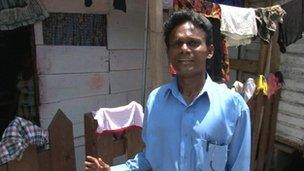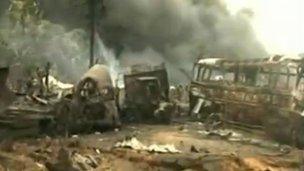Scottish police officers guide Sri Lankan counterparts
- Published
Officers from the Scottish Police College devise a way to retrain Sri Lanka's police force after 30 years of civil war
Scottish police officers are coming to the end of a three-year project to retrain their counterparts in Sri Lanka. BBC Scotland reporter Willie Johnston travelled to the Indian Ocean island to see how the venture was working.
Nanda Kumara has no hint of shame on his face when he shows me his home.
I step over an open sewer to reach the door where Nanda's wife and four children are gathered. Inside is a cramped living area almost totally devoid of furniture. A curtain separates it from the single bedroom where the family's sparse collection of clothes are crammed into a tower of baskets.
On the far side of the sleeping room is a rudimentary kitchen where a simple rice dish simmers on a gas burner.

Nanda Kumara shows his modest Sri Lankan home
And then, at the back of the house where the toilet would be had it existed, is a leaky pipe dripping water for washing and cooking.
Nanda has lived in these slums of the Mattakkuliya district of the Sri Lankan capital, Colombo, for 30 years. He and his family, part of a teeming multi-racial mass of 40,000 inhabitants co-existing in insanitary conditions with no home comforts.
This breeding ground of disease, despair and disorder is all Nando has known. But he is now part of a movement to change it for the better - a movement led by the once despised police.
It's only two years ago since Mattakkulia police station was attacked by an angry mob. Crime was high, respect for authority low.
But the attack coincided with the arrival here of a new police chief. Assistant Superintendent Muditha Pussalla had just completed a diploma course in Community Policing at the Sri Lanka Police Academy, devised and delivered by officers from the Scottish Police College of Tulliallan in Fife.
They'd been approached to help Sri Lanka convert its police force from a post-civil-war armed militia, which had lost the trust and confidence of the people, into a more people-friendly organisation concerned not just with enforcing law and order but also tackling some of the social issues at the root of crime.
The Scottish government put up £400,000 and a small team of officers was seconded to run it. The lead trainer was a Scottish inspector Mike Kneeshaw who'd spent most of his police career in rural Galloway.
"The brief that we received from the Scottish government was to develop a qualification that would give credibility to the training we delivered to the Sri Lankan police officers, so the development of an international vocational award in community policing became much of the focus of our activity".
It was decided to aim that diploma training at the rank of Assistant Superintendents. They were chosen because of they were key middle managers, each in charge of three police stations and several hundred officers. As part of their Academic studies they had to design and implement a practical community policing plan relevant to problems in their own particular area.

Sri Lanka was devastated by war in 2009
Muditha Pussalla was an early convert. From college, he returned to the slums of Mattakkuliya and set about getting "community leaders" on board with his agenda for change. Nanda Kumara was one.
The police organised sports and community events and laid on emergency meals to feed some of the poorest families, many whose bread-winner is in prison.
But it went further. Few street children in Mattakkuliya went to school. At home along all day, or wandering the streets, they were vulnerable to abuse which rife in areas like this, or turned to crime themselves.
The police rounded-up dozens of children and took them to the nearby Thotawattha Methodist School where, for the most part, they've settled into a life of education and stability.
J.A. Kamil, the school's deputy principal, told me: "The attendance was very, very low. The police observed that and started a very comprehensive type of programme. They rounded up the slum area and brought the drop-out children here and they provided them with shoes, shirts, uniforms, books, etc. They brought the children here and now the attendance is good."
Immediate action
The police funded play equipment for the school and new toilets. They also provided a "complaint box" for children to post notes of any concerns they have, or crimes they are subjected to.
Deputy Principal Kamil again: "Sometimes the children write that they don't have shoes or a uniform or books. Sometimes they say 'this particular uncle is harrassing me, or this person is trying to molest me'.
"The police come here and immediately take action. I think the crime level and harassment level has gone down."
Inspector Mike Kneeshaw went with me to see the differences the classroom training provided by Scottish officers is making to real lives on the ground in Sri Lanka. He is impressed.
He said: "That was a major challenge in terms of a social development project and when Muditha proposed it to us as part of his studies we thought it was perhaps rather too ambitious. But in reality, when you go and see what he has achieved and what is ongoing within that community, quite clearly he has made a remarkable difference and that is credit to him."
On the strength of this, Muditha Pussalla has since been promoted to the rank of Superintendent and made director of community policing for the whole of Sri Lanka. He's very much a man on a mission.
'Be proactive'
He tells me: "With the community policing concept, we are thinking about the society, we are to consult the society bring in partnership work. It's must not only be about enforcement."
But with the Scottish policing training project coming to an end, is Muditha's enthusiasm and the new-found skills of 90 Assistant Superintendents who have passed their community policing diplomas (out of a total police strength of 83,000) sufficient foundation on which real change can be built in the years ahead?
Bruce Milne has led the project for the Scottish Police College.
He said: "Our hope has to be that we have built sufficient momentum that they will continue. I think they have the desire. Whether they have sufficient influence and drive to keep it going is another issue.
"There is an inherent danger that they fall back to what they knew, what they were comfortable with, because that is reactive. What we have encouraged them to do over the past two-and-a-half years is to be proactive, to go out and engage with communities, find out what their requirements are and to drive a changing agenda.
"Whether they can sustain that, or not? We have to put faith in the people we have trained and encouraged through that process."
- Published17 March 2015